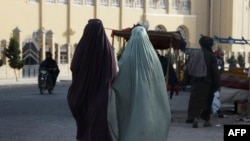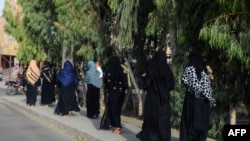A Taliban mandate that women cover their faces while on television is seen as an attempt to erase female journalists, say media and women's rights activists.
Afghan media outlets on Thursday said the Taliban Ministry of Vice and Virtue informed them that female presenters must cover their faces while on air.
Taliban spokesperson Zabihullah Mujahid told media on Thursday the move is "a religious order" that all women, including journalists, should obey.
"It helps them with their modesty and honor. It helps with their family's modesty. It is not something to call a threat," said Mujahid.
But female journalists and rights activists who spoke with VOA see the order as a further obstacle to them working. Many see it as a step backward and say it will be harder to communicate if their faces are covered.
"We are very concerned about the new restrictions," Lima Spesali, a presenter at the Kabul station 1TV, said. "It has become increasingly clear that the Taliban are imposing further restrictions on women journalists."
"In their first decrees, they recommended (to us) to observe hijab, and today they are telling us to cover our faces. Later, I think, they will bar women (media) from appearing on TV and order them to stay home," said Spesali.
Spesali said that the orders are making it difficult for women to work as journalists.
One female journalist in Kabul, who spoke on condition of anonymity, told VOA that by ordering women to cover their faces on air, the Taliban want "to erase them from media."
She called the new rule a violation of rights for women and journalists.
Parwiz Aminzada, a spokesperson for the Afghan Independent Journalists Association, told VOA he agrees that the hijab should be observed, "but not the way it is now."
"We believe that we should talk and have a discussion or a dialogue on how hijab has to be observed by media in Afghanistan so we can reach a conclusion that is acceptable to all the parties," Aminzada said.
Somia Walizada, a board member of the Afghan Journalists Center who is based in Turkey, says she sees the order as "a warning for female journalists."
"In addition to having a negative psychological impact, female journalists will not be able to communicate their message to their audience on TV by wearing niqab," she said, referring to a veil that covers the face.
She called on the Taliban to reconsider the order.
But TOLOnews, in a statement Thursday, said that the Taliban have called the order "a final verdict and not up for discussion."
After seizing power in August 2021, the Taliban imposed restrictions on women, including their rights to education, work and travel.
Women are now required to cover up from head to toe when outside their homes.
Heather Barr, of the international nonprofit Human Rights Watch, told VOA's Afghan Service the mask mandate aims to "erase women" from public life.
"This rule for women journalists is incredibly harmful and it is a violation of their rights, their expression and it is another step toward the Taliban's efforts to erase women completely from public life in Afghanistan," she said.
The Taliban takeover had an immediate impact on female journalists, media rights groups say.
A joint survey by media watchdog Reporters Without Borders (RSF) and the Afghan Independent Journalists Association in December found that 84% of women journalists and media workers had lost their jobs since August 2021.
Khadija Ashraf, who used to be managing editor of Bakhtar News Agency in Ghazni province, told VOA the restrictions will make life for the few female journalists still in Afghanistan even more difficult.
"Many female journalists were forced to leave Afghanistan. Female journalists in the provinces have to stay home. And the new restrictions will make it difficult for those who are still working," Ashraf said. She moved to Europe after the takeover.
"If this continues, we will not have any female journalists, and no one will be there to raise the voices of women in Afghanistan," she said.
This story originated in VOA's Afghan division.





